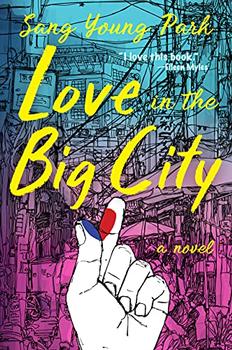Summary | Excerpt | Reviews | Beyond the book | Read-Alikes | Genres & Themes | Author Bio

A Novel
by Cho Nam-joo, Jamie Chang"Kim Jiyoung is thirty-three years old, thirty-four Korean age. She got married three years ago and had a daughter last year. […] Jiyoung's abnormal behavior was first detected on 8 September."
So begins Kim Jiyoung, Born 1982, Cho Nam-Joo's daring excavation of a young woman crumbling under the strain of unrelenting misogyny, which has sold over a million copies in its native South Korea. Jiyoung (the Korean naming convention places a person's family name before their given name), an average, unremarkable woman, one day begins to imitate the voices of other women she has known throughout her life—a phenomenon neither she nor her husband can explain, which prompts them to visit a psychiatrist.
Kim Jiyoung's psychosis, while a compelling hook, ultimately takes a backseat after the first few pages and isn't revisited until the novel's end. After the reader is introduced to 33-year-old Jiyoung, the plot lurches back in time and gives a perfunctory and linear account of her life: first her childhood, then adolescence, then adulthood. In each section we witness the ways in which Jiyoung has been affected by the various manifestations of sexism that plague contemporary Korean society. As a child she is admonished by her grandmother for drinking her brother's baby formula, as the health of the family's only son is ultimately more important than her own; in high school she and her fellow female students are unable to play sports, so restrictive are their uniforms; after marrying her husband and becoming pregnant, Jiyoung is forced to resign from a job she loves in order to provide childcare.
As these events unfold around her, Jiyoung herself is something of an empty vessel. We know nothing of her hobbies, her friends, bad habits, or pet peeves. Indeed, this novel is less of a character study than an extrapolation of the lived experiences of a generation of women in South Korea. "Kim Jiyoung," a name as common as "Jane Smith" in the U.S., was purposefully selected by the author in an effort to genericize her protagonist — to force her audience into Jiyoung's shoes as they read.
The impartial, almost clinical quality of the third-person narration is reinforced by Cho Nam-Joo's decision to litter her novel with statistics about systemic misogyny in contemporary Korea, complete with sourced footnotes:
In 2005, the year Kim Jiyoung graduated from college, a survey by a job search website found that only 29.6 per cent of new employees at 100 companies were women, and it was even mentioned as a big improvement.9
9 2005 Job Market with Key Words, Dong-A Ilbo, 14 December 2005
This blend of fiction and nonfiction is exactly what makes this novel such a powerhouse: at no point is the reader allowed the comforting illusion that Jiyoung's experiences are fantastical or atypical.
The women depicted in Kim Jiyoung, Born 1982 behave in direct opposition to stereotypes that some Western readers may have about East Asian women — that they're subservient, or blind to their own disenfranchisement. None of the female characters in this novel have any illusions about the deeply unjust society that they live in. Jiyoung's sister, her mother, her work manager, a lady who helps Jiyoung when a young man is stalking her on the bus; they all stick up for themselves and know they're trapped in an unfair system. This only serves to emphasize their powerlessness and highlight why feminist movements so often feel like an uphill battle, albeit a critical one: misogyny persists even when individuals recognize and resist it.
An understanding of Cho Nam-Joo's intentions and the context of the setting is essential to appreciating the novel. It is plotless and straightforward in a way that could be perceived as artless, or curiously devoid of emotion. And yet it simmers with untapped fury, destined to resonate as strongly with Western readers as it has in its native country.
![]() This review was originally published in The BookBrowse Review in May 2020, and has been updated for the
March 2021 edition.
Click here to go to this issue.
This review was originally published in The BookBrowse Review in May 2020, and has been updated for the
March 2021 edition.
Click here to go to this issue.

If you liked Kim Jiyoung, Born 1982, try these:

by Elena Medel
Published 2023
From award-winning Spanish poet Elena Medel comes a mesmerizing new novel of class, sex, and desire.

by Sang Young Park
Published 2022
A funny, transporting, surprising, and poignant novel that was one of the highest-selling debuts of recent years in Korea, Love in the Big City tells the story of a young gay man searching for happiness in the lonely city of Seoul.
Your guide toexceptional books
BookBrowse seeks out and recommends the best in contemporary fiction and nonfiction—books that not only engage and entertain but also deepen our understanding of ourselves and the world around us.